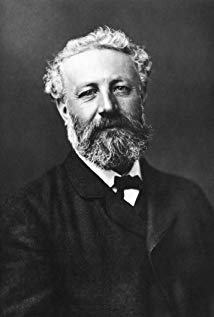|
SATURDEE OPRY LINKS 29:
Jules Verne Edition
 
Reri Grist
Jules Verne
Saturdee Opry Links Overture!
"Abduction from the Seraglio," by Mozart.
Good for what ails you.
https://www.youtube.com/watch?v=KFz0NhnLJC0&fbclid=IwAR2bEVrpYbIJTectcxN3Mbk23Y6zi0P_4iM7k3kSYNoYr0CPRmvtt9HH87I
1.
The plots in Mozart operas are like Marx Brothers movies---sheer chaos with good
music and incomprehensible resolution. Witness this summary of just part of act
two of "Abduction from the Seraglio:"
"Pedrillo informs Blonde that Belmonte has come and is planning to rescue them.
Blonde is filled with joy. (Aria: "Welche Wonne, welche Lust" – "Oh, the happy,
happy day"). After singing a short ditty to boost his courage (Aria: "Frisch zum
Kampfe" – "Now Pedrillo, now for battle!"), Pedrillo invites Osmin to drink
(Duet: "Vivat Bacchus! Bacchus lebe!" – "Here's to Bacchus, long live Bacchus").
Despite his religious prohibition against alcoholic beverages, Osmin drinks
heavily and falls asleep."
Got it? This is about 1/50th (or less) of the events in "Abduction from the
Seraglio." Of course, there is an overarching conflict, but who needs logic when
it comes to Mozart? In any case, the meaning of this little duet could not be
clearer: Prozit! Skoll! Slante! Vivat Bacchus! Here it is, with English
subtitles.
https://www.youtube.com/watch?v=HAPYT7Lk2bc
Translation:
https://www.opera-arias.com/mozart/die-entf%c3%bchrung-aus-dem-serail/vivat-bacchus-bacchus-lebe/
About the opera:
https://en.wikipedia.org/wiki/Die_Entf%C3%BChrung_aus_dem_Serail
2.
The main abduction I experience in watching Mozart's "Abduction from the
Seraglio" is the stealing of my boredom. Okay, that's not entirely true, as one
great little aria after another can be too much of a good thing, at least for my
slow ears. But. . .here is a wonderful 1967 clip of Reri Grist with the
sprightly, antic little song, "Welche Wonne, welche Lust ," or "What bliss, what
rapture." Which is what I feel every moment of every day! (Urp.)
Setting: the gardens of Pash Selim's country house
Synopsis: After Pedrillo tells Blondchen (Konstanze's English maid, now assigned
to Osmin) two bits of good news, that Belmonte has arrived and been accepted by
the Pasha as an potential employee, Blondchen sings of her bliss and joy and
promises to tell Konstanze right away.
https://www.youtube.com/watch?v=dBmWfjpdHkI
Translation:
http://www.aria-database.com/search.php?individualAria=282
About Ms. Grist, still with us at 86:
https://en.wikipedia.org/wiki/Reri_Grist
3.
Jules Verne, opera composer? Not quite. But Jules Verne, opera librettist?
Quite. The great author wrote song lyrics, and aria lyrics---entire
libretti---it seems. In fact, he did this before becoming a serious writer of
fiction. And one of these songs, set to music by Alfredo Catalani in 1876, was
recycled in 1892 for his beloved opera, "La Wally." Yes, that's right, boxing
fans---the gorgeous, haunting aria, "Ebben? Ne andrò lontana" (worthy of
Puccini, in my book), or at least its principal melody, was originally found in
"Chanson groenlandaise," with lyrics by Verne(!). You heard it first on Saturdee
Opry Links! Tell the kids! Alert Homeland Security! Here it is, sung by Akiko
Nakajima. Recognize it? No? Keep listening. . .
https://www.youtube.com/watch?v=UbaRf7mkmrU
I regret that there is no translation available, but for the many SOL followers
who speak French:
http://www.lieder.net/lieder/get_text.html?TextId=18185
And for comparison's sake, here is "Ebben? Ne andro lontana," sung by Anna
Netrebko:
https://www.youtube.com/watch?v=YrFx3Bie7Dk
About Verne:
https://en.wikipedia.org/wiki/Jules_Verne
4.
Return with us, now, to those thrilling days of opera yesteryear. . .There are
many versions of this landmark love duet from Verdi's "Don Pasquale," but this
one just jumps out at you for its purity of voice and heart. These are the (cliche
ahead!) honeyed tones of Tito Schipa and Amelita Galli-Curci (say it fast, ten
times), with "Tornami a dir." Oh, my, this is just lovely. Ms. Galli-Curci's
story is quite remarkable. From Wiki:
"She was born as Amelita Galli into an upper-middle-class family in Milan, where
she studied piano at the Milan Conservatory, winning a gold medal and at the age
of 16 was offered a professorship. She was inspired to sing by her grandmother.
Operatic composer Pietro Mascagni also encouraged Galli-Curci's singing
ambitions. By her own choice, Galli-Curci's voice was largely self-trained. She
honed her technique by listening to other sopranos, reading old singing-method
books, and doing piano exercises with her voice instead of using a keyboard.
https://www.youtube.com/watch?v=FYcIRg0u6UM
Translation:
Italian:
Tornami a dir che m'ami,
dimmi che mia/mio tu sei;
quando tuo ben mi chiami
la vita addoppi in me.
La voce tua sì cara
rinfranca il core oppresso;
sicuro/sicura a te dappresso,
tremo lontan da te.
ENGLISH:
Tell me again that you love me,
tell me that my / mine you are;
when you call me well
life doubles in me.
Your voice so dear
relieves the oppressed core;
safe / secure to you near,
I tremble away from you.
More about Ms. Galli-Curci:
https://en.wikipedia.org/wiki/Amelita_Galli-Curci
5.
One exquisite Tito Schipa duet deserves another, does it not? Or should I say
one Toti del Monte duet? Or more correctly, one Tito-Toti duet? It was
inevitable, probably that these two would sing together, given their first
names. Here are the tender melodic contours of "Prendi L'Anel ti Dono," from
Bellini's "La Sonnambula." ("The Sleepwalker.") Take it away, Tito.
I mean, Toti.
https://www.youtube.com/watch?v=8wjfByGYJrw
Translation: (search for "Prendi," and you will find both Italian and English.)
http://www.murashev.com/opera/La_sonnambula_libretto_English_Italian
About the opera:
La sonnambula (The Sleepwalker) is an opera semiseria in two acts, with music in
the bel canto tradition by Vincenzo Bellini set to an Italian libretto by Felice
Romani, based on a scenario for a ballet-pantomime written by Eugène Scribe and
choreographed by Jean-Pierre Aumer called La somnambule, ou L'arrivée d'un
nouveau seigneur. The ballet had premiered in Paris in September 1827 at the
height of a fashion for stage works incorporating somnambulism.
About Toti:
https://en.wikipedia.org/wiki/Toti_Dal_Monte
About Tito:
https://en.wikipedia.org/wiki/Tito_Schipa
6.
Now that those two duets have left you placid, sedate, transported into a soft
rosy haze of minor bliss, time to shake it up, baby. What's that I hear? The
mighty voice of Franco Corelli? Yet it's not so mighty, not at the start,
anyhow, of "Ah, si ben mio," from Verdi's "Il Trovatore." It rather croons,
almost. Not until he follows up with "Di Quella Pira" is his spinto power in
overwhelming evidence.(A lirico spinto tenor is a lyric tenor who also has the
power to push through on the high notes, often soaring above everything else.) A
stupendous performance, possibly un-toppable. You would never know that he
suffered from terrible stage fright, every time. The soprano is Gabriella Tucci.
https://www.youtube.com/watch?v=xDHSFxVbMWc
Synopsis:
In a chamber adjoining the chapel at Castellor, Leonora and Manrico vow their
love for each other. After Manrico's aria "Ah sì, ben mio coll'essere" ("Ah,
yes, my love, in being yours"), they are about to take their marriage vows.
However, Ruiz, Manrico's comrade, suddenly returns to report that Manrico's
mother Azucena is to be burned at the stake. Manrico calls together his soldiers
and sings of how they will save Azucena from death: "Di quella pira l'orrendo
foco tutte le fibre m'arse, avvampò!..." ("The horrible blaze of that pyre
burned, enflamed all of my being!...")
Translation, "Ah, si ben mio":
http://www.aria-database.com/search.php?individualAria=513
Translation, "Di Quella Pira:"
http://www.aria-database.com/search.php?individualAria=514
7.
And here is some more Verdi, but sort of the opposite extreme of the
pyrotechnics of "Di Quella Pira" (previous post, if you're keeping score at
home.) This is the exquisitely nuanced melodiousness of "Caro Nome," an aria for
soprano from "Rigoletto," as exquisitely nuanced by wonderful Sumi Jo. Don't
like her? So Sumi. I admit to picking this partially for her outfit.
https://www.youtube.com/watch?v=v2oeuLpN600
Setting: The house of Rigoletto
Synopsis: After the Duke in the guise of a poor student named Gualtier Malde has
seduced her, Gilda sings of her new-found love.
Translation:
http://www.aria-database.com/search.php?individualAria=261
8.
When in doubt, Mozart. You see, life is a horror. It's really that simple. The
Buddhists call it "Dukkha," which is often translated as "suffering," though
"enduring" might just as well suffice. The young are generally blessed with
obliviousness and arrogance---the "I'll never die" perspective---which is likely
just part of bioprogramming. As you age, though, the truth is inescapable. We
don't know who we are, what we are, when we are, where we are, or why we are.
(Gee, that's the five w's of journalism lede fame.) And every day that we avoid
catastrophe and heartbreak is just nothing short of miraculous. Such a pity that
so few understand this, as they blaze down freeways in gigantic SUVs, putting
lives at risk. So when we have artists who create things that move us, they
are often removing us temporarily from "Dukkha," enabling us to forget, for a
moment, the horror of this absurd endurance contest. Poor Mozart, who died at
only 35, just gushed forth with all manner of joyful fare. It would be entirely
appropriate if we all just dropped to our knees in gratitude to him, each day.
Here is wonderful, pioneering African-American soprano Reri Grist, again (who
also offered some relief from Dukkha), with a svelte, tender, and yes,
frivolous, little aria from "Abduction from the Seraglio" (again) entitled "Durch
Zärtlichkeit und Schmeicheln," which translates to "With tenderness and
coaxing." Which, frankly, is what I require to facilitate getting out of
bed each day.
https://www.youtube.com/watch?v=qVgCmti3mBU
Translation:
http://www.aria-database.com/search.php?individualAria=279
Setting: the gardens of Pasha Selim's country home.
Synopsis: Osmin tries to order Blondchen to satisfy his every wish. Blondchen
responds vehemently, though, stating that she will not be ordered around. The
only ways she can be won over is by tenderness, flattery, and good humor and
Osmin's bad attitude only make her want him less.
9.
Talk about being hauled out of the depths of despair. . .here is an aria about
exactly that. Written by that evil Wagner guy---you know, whose every opera
champions love, yes, love, as the only redeeming path for humanity. This is the
"Ode to the Evening Star," or "O du, mein holder Abenstern," from Wagner's "Lohengrin,"
as sung so tenderly by baritone Hermann Prey. Love of nature and its beauty as
the only palliative. . .
https://www.youtube.com/watch?v=IeIELcAod1k
"Dusk covers the land like a premonition of death,
Wraps the valley in her dark mantle;
The soul that longs for those heights
Dreads to take its dark and awful flight.
Then you appear, O loveliest of stars,
And shed your gentle light from afar;
Your sweet glow cleaves the twilight gloom,
And as a friend you show the way out of the valley."
Translation:
https://www.oxfordlieder.co.uk/song/1393
FINAL BOW:
Oh, my goodness. There is Tristan, the great hero, dead, leaving his beloved
Isolde forever. And there are his great friends, comrades, heads hanging in
desolation, helplessness. This is what life is, folks. Having the
rug pulled out from under you, guaranteed, no matter how heroic, decent, good
you might have been. Lights fucking out. The End. Finis. Pffft. Some deal, eh? And yet we have this poignant, utterly noble impulse to express. .
.what? Love, that's what. Love. The "all you need is" item. Ultimate grief,
loss, despair, are simply expressions of love, right? Wagner knew this better
than I do, better than most, I'm sure. And here is poor Isolde, left so finally,
terribly alone, singing of love. . .of Tristan. This is the "Liebestod," or
"love-death," from the shattering opera, "Tristan und Isolde." "Mild und Leise,"
or "Mildly and gently." This is music, art, that somehow captures this piquant,
perhaps salient phenomenon of all human experience. It is, as its title
suggests, incomprehensibly tragic, and incomprehensibly beautiful. The soprano
is Waltraud Meier.
https://www.youtube.com/watch?v=WFUYrJEoMQU
Translation:
http://www.aria-database.com/search.php?individualAria=989
The Tristan Chord: How This Opera Was Revolutionary
https://www.youtube.com/watch?v=gpWg_cZkDho
Back to Opera Links
Back to Home Page
|



